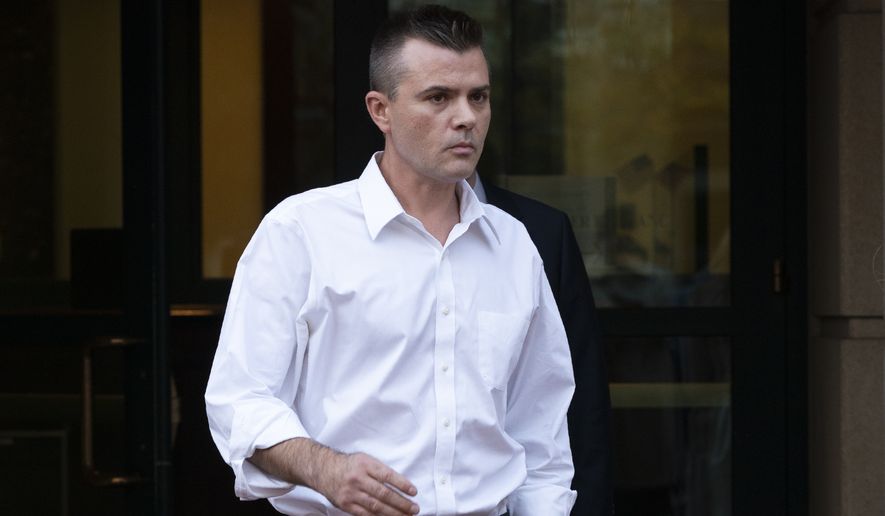A Russian analyst who served as a source for a dossier of unverified accusations against former President Donald Trump was arrested Thursday on charges of lying to the FBI about how he gathered the information.
Igor Danchenko worked with former British spy Christopher Steele to compile the unproven claims about Mr. Trump during the 2016 presidential campaign. He is charged with five counts of lying to the FBI as part of special counsel John Durham’s probe.
If convicted on all five counts, Mr. Danchenko could face up to five years in prison and a $25,000 fine for each charge.
Appearing before U.S. District Judge Theresa Buchanan at the federal courthouse in Alexandria, Virginia, Mr. Danchenko wore a white dress shirt and olive green pants.
His attorney said Mr. Danchenko wished to plead not guilty, but Judge Buchanan reminded him that the hearing was not an arraignment.
Prosecutors said they would not seek pretrial detention but asked for electronic monitoring. They noted that Mr. Danchenko has family in Russia and “unexplained streams of income from foreign sources.”
Judge Buchanan initially agreed to electronic monitoring. At the end of the hearing, however, prosecutors said pretrial services couldn’t provide an electronic monitoring device on Thursday. They asked the judge to wait a day before ordering monitoring.
“You couldn’t be very concerned,” Judge Buchanan shot back. She said she would waive the electronic monitoring.
Mr. Danchenko is next scheduled to appear in court on Wednesday.
Prosecutors said the information Mr. Danchenko provided to Mr. Steele and later to the FBI was based on conversations that either did not happen or came from a different source.
In one instance, they said, Mr. Danchenko lied to the FBI because one of his sources for the report had ties to the Democratic Party.
The dossier was filled with rumors and unproven assertions claiming Mr. Trump and members of his 2016 campaign team were compromised and conspiring with Russian intelligence officials to win the presidential election. Mr. Steele prepared the dossier for Fusion GPS, which worked for a law firm representing the Democratic Party and Hillary Clinton’s presidential campaign.
During interviews with the FBI to corroborate accusations in the Steele dossier, Mr. Danchenko recounted conversations he purportedly had with sources about contacts between the Trump campaign and Russia, according to the indictment.
Prosecutors say he lied about those conversations with “sub-sources,” and they either did not happen or the information he used came from somewhere else.
In one instance, prosecutors said, Mr. Danchenko claimed he never communicated with an unidentified U.S. resident, who was an executive at a public relations firm, about the claims in the dossier.
However, prosecutors said Mr. Danchenko sourced at least one accusation anonymously to the executive, who is described in the indictment as “a long-time participant in Democratic Party politics” with ties to former President Bill Clinton.
The unidentified executive’s role as a source was “highly relevant and material to the FBI’s evaluation of those reports,” the indictment stated.
Mr. Durham said the executive’s connections to the Democratic Party were so extensive that they bore upon the “reliability, motivation and potential bias as a source of information.”
Some of the information for the dossier gathered by Mr. Danchenko was collected at events in Moscow organized by the executive, according to the indictment.
The indictment says Mr. Danchenko told agents about interactions he purportedly had with the then-president of the Russian-American Chamber of Commerce, believed to be Sergei Millian.
Mr. Danchenko claimed he had a phone conversation with Mr. Millian as part of the information he collected for the dossier and the two agreed to meet in New York.
Prosecutors wrote in the indictment that “Danchenko fabricated these facts.”
Mr. Durham said the lies were “material to the FBI” because his claims “played a role in the FBI’s investigative decisions and sworn representations that the FBI made to the Foreign Intelligence Surveillance Court.” The court approved a wiretap of Trump campaign aide Carter Page because the FBI suspected he had ties to Russia.
The dossier was part of the FBI’s justification for surveilling Mr. Page and for the larger Russian collusion probe, dubbed “Crossfire Hurricane.”
The FBI also dedicated significant time and resources to corroborating the accusations in the dossier, including the reliability of Mr. Danchenko’s sub-sources.
Mr. Danchenko was widely believed to be the “primary sub-source” for Mr. Steele. FBI agents in 2017 interviewed Mr. Danchenko when they were attempting to verify the dossier’s claims.
That interview raised questions among FBI agents about the veracity of claims in the dossier. Despite growing doubts about that information, the FBI probe continued.
A 2019 Justice Department inspector general’s report blasted the FBI for relying on Mr. Steele’s assertions. The same report found that when the FBI questioned Mr. Danchenko about the claims, he insisted that the dossier, including the information he provided, overstated details.
Mr. Danchenko defended his work in a 2020 interview with The New York Times. He said he had simply been tasked with gathering raw intelligence and passed it on to Mr. Steele.
In the same interview, he denied reports he was a Russian agent.
Mr. Danchenko’s arrest is the latest sign that Mr. Durham’s investigation is picking up steam after a plodding start in April 2019. Mr. Trump and other conservatives had mocked the investigation for its slow pace.
In September, Mr. Durham secured an indictment against Washington lawyer Michael Sussmann, who is accused of making false statements to the FBI.
• Jeff Mordock can be reached at jmordock@washingtontimes.com.




Please read our comment policy before commenting.